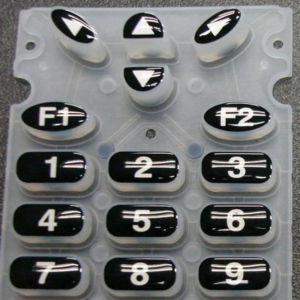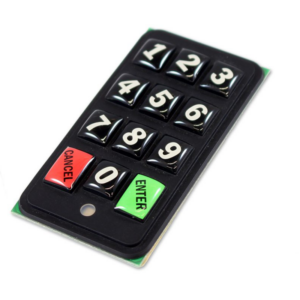Epoxy keypads, often referred to as epoxy-coated keyboards or buttons, are a specialized type of silicone rubber keypad featuring a protective epoxy resin surface coating. This process includes treatments like laser etching, color spraying, and matte surface finishing. The epoxy coating enhances the keypad’s durability and functionality, offering superior resistance to abrasion, chemicals, and oils. Epoxy-coated silicone keypads boast a clear, visually appealing surface similar to plastic button covers, but with greater flexibility. Compared to traditional silicone rubber keypads with plastic caps, epoxy-coated versions offer significant cost savings, making them a practical choice for a wide range of applications.
Specification
Material: silicone rubber
Color: transparent or any colors
Hardness: shore A 30°~80°
Size: customized size
Tolerance: based on customer’s requirement
Printing: silk screen, radium carving
Molded Way: compression molded
Conductive Way: carbon pills, conductive ink printing, metal domes, metal pills
Surface Protective: PU coating, matte smooth coating, epoxy coating
Performance: aging resistance, cold resistance, heat resistance, chemical stability, waterproof, eco-friendly, durable
Certificate: ISO9001-2015, IATF16949, ROHS
OEM: available
Samples: free available samples
Packing: PE bag & carton, customized packing
Logo: silk printing, laser etching
Application: industrial, medical, automotive, consumer electronics, household, etc
Advanced Conductive Technologies in Silicone Keypads
- Carbon Pill:
Our Silicone Keypad utilizes small carbon-filled protrusions for conductivity. When pressure is applied, these pillars facilitate electrical connectivity, ensuring a responsive and reliable user interface.
- Conductive Oil:
The Silicone Keypad incorporates a conductive oil solution to create seamless electrical pathways. This solution bridges gaps, enabling signal transmission upon pressure application to the keypad surface.
- Metal Dome:
Metal Dome conductivity involves integrating small, dome-shaped metal elements beneath the keypad surface. Pressing these domes creates a tactile response and completes the electrical circuit.
- Non-Conductive:
Strategically using non-conductive materials in specific areas prevents unintended electrical contact. This precise control over electricity flow prevents interference or unintentional input.
Reviews
There are no reviews yet.